Garcetti, transit leaders envision an L.A. of self-driving cars and Hyperloop
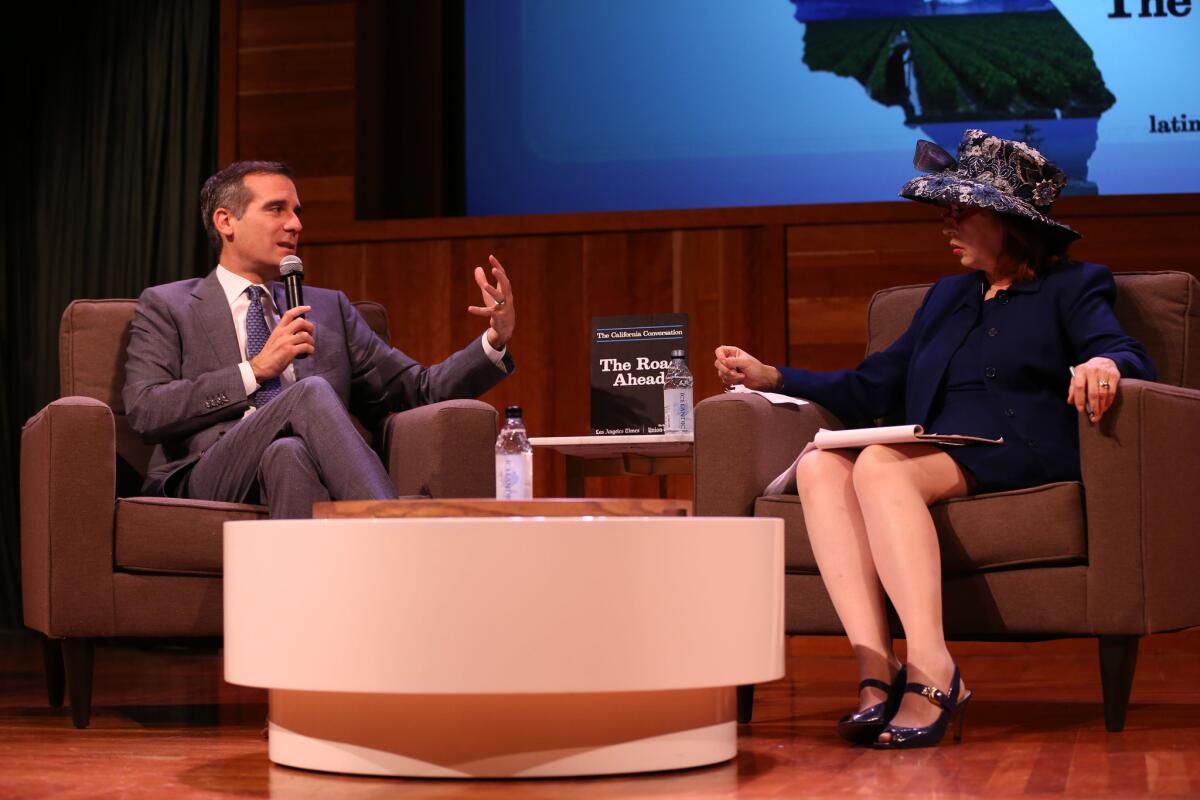
Los Angeles Mayor Eric Garcetti speaks with Patt Morrison during the Los Angeles Times’ “The Road Ahead” California Conversation transit panel at the Mark Taper Auditorium on Monday.
U.S. Transportation Secretary Anthony Foxx did not mince words.
The future of Los Angeles and the West “looks crowded,” he said, conjuring nightmarish images of gridlock in the minds of the hundreds of Angelenos.
But over the course of more than three hours Monday, transit experts, business executives and policymakers such as Foxx also presented hopeful visions of an exciting and high-tech transportation future. Later in the 21st century, they said, people will sit in self-driving cars, freight will move at 750 mph though vacuum tubes, and the Los Angeles International Airport will finally connect to rail.
“I think this is a decade of incredible re-imagining of our city,” Mayor Eric Garcetti said. “I think technology will fundamentally change how we get around.”
Read the latest Essential California newsletter >>
The local and federal leaders came together Monday at the Mark Taper Auditorium for the latest installment of The Times’ California Conversation series. The event, titled “The Road Ahead,” thrust the experts into discussions with Times reporters in front of an audience of more than 250 people.
The Road Ahead

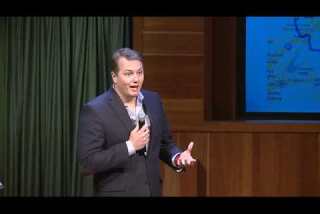
California Conversation: Chris Urmson, Head of Google's Self Driving Project (Excerpt 1)
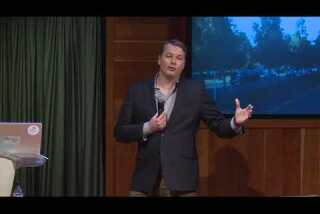
California Conversation: Chris Urmson, Head of Google's Self Driving Project (Excerpt 2)
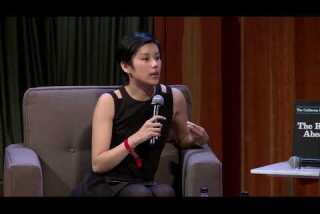
California Conversation: Chris Urmson, Head of Google's Self Driving Project (Excerpt 3)
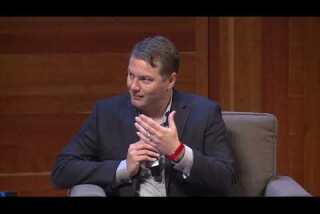
California Conversation: Chris Urmson, Head of Google's Self Driving Project (Excerpt 4)
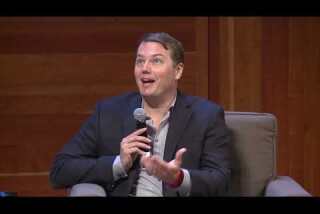
California Conversation: Chris Urmson, Head of Google's Self Driving Project (Excerpt 5)
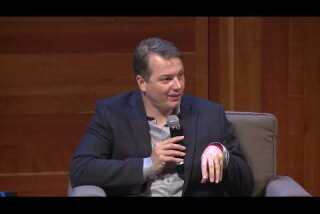
California Conversation: Chris Urmson, Head of Google's Self Driving Project (Excerpt 6)
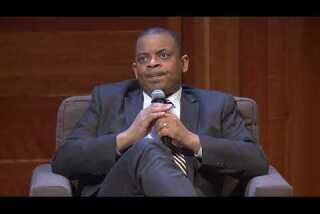
California Conversation: U.S. Transportation Secretary Anthony Foxx (Excerpt 1)
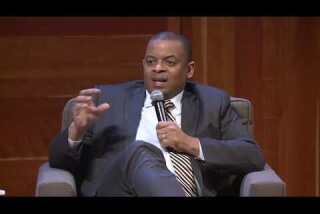
California Conversation: U.S. Transportation Secretary Anthony Foxx (Excerpt 2)
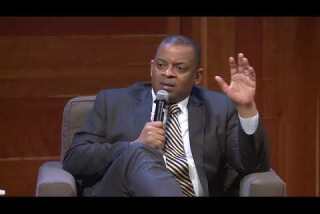
California Conversation: U.S. Transportation Secretary Anthony Foxx (Excerpt 3)
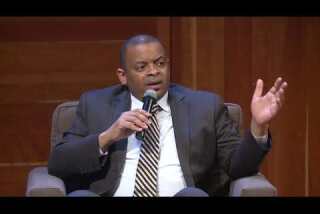
California Conversation: U.S. Transportation Secretary Anthony Foxx (Excerpt 4)
Many of those in attendance were locals who said they worked directly in the transportation industry or in advocacy groups that seek funding or push for policy change. Of interest to the observers:
• Garcetti said the city’s new GoLA app, which tells smartphone users the fastest, cheapest or greenest way to get from one point to another, will soon include a system that allows users to pay for whatever transportation mode they choose to use.
• He confirmed that the Los Angeles County Metropolitan Transportation Authority plans to place a proposal on the November ballot that would seek to raise the countywide sales tax by a half-cent and extend an existing tax for almost two more decades.
• He promised there would be parking at some of the new Expo Line stations opening in May.
Meanwhile, Metro is preparing to present a list of major highway and rail projects to its board that could be built with $100 billion to $120 billion in sales tax revenue. CEO Phil Washington said Monday that he would “present the projects that represent the greatest benefit” and “let the politics fall where they may.”
“I think we are at a crossroads, not just here in L.A. County but [in] the country, in terms of what to do about congestion … and what to do about decaying infrastructure,” he said.
“Do we just say we’re going to let congestion eat us alive? We want to try to mitigate this congestion that’s out there. … I say we build the infrastructure now.”
But much of the conversation took on a more abstract quality that at one point invoked a reference to “The Jetsons” for the cartoon’s portrayal of a future filled with flying cars and jet packs.
Chris Urmson, head of Google’s self driving car project, offered a presentation showing how its autonomous cars learned to avoid even the most anomalous hazards -- such as a duck in the road being chased by a person in a wheelchair.
Urmson said 94% of accidents are caused by human error and argued that self-driving cars would save lives.
“If somebody T-bones a [self-driving] car while it’s going though a green light, that’s probably not the car’s fault,” he said.
Rob Lloyd, CEO of Hyperloop Technologies, then took the stage to discuss his company’s plans to create a high-speed transportation system that will shuttle compartments filled with people and goods through large tubes.
He said he expects the company’s first project to begin next year, adding that he hoped the project would be in the L.A. region.
“We will not accept that it’s going to take 10 years to make this happen,” Lloyd said.
Indeed, Garcetti, Foxx and others agreed that technology will soon reshape how people get where they’re going in one of the nation’s most notoriously congested cities.
“Since the wheel, we’ve just been improving the technology that we control,” Foxx said. “And now we’re at a stage where now the technology can take on more of the operating tasks that we always assumed we’d be doing.”
There are going to be close to 40 million people in the region in the years to come, Foxx said, so officials will need to keep investing in infrastructure.
“These are urgent issues,” he said. “Sometimes I feel like … Noah trying to argue for building the Ark.
“Do we need more investment? Yes, we need much more investment.”
Twitter: @ByMattStevens
ALSO
L.A. logs its hottest February on record
Passenger bus teaches Google robot car a lesson
Aerojet Rocketdyne and ULA win Air Force funds to replace Russian engine
More to Read
Sign up for Essential California
The most important California stories and recommendations in your inbox every morning.
You may occasionally receive promotional content from the Los Angeles Times.










